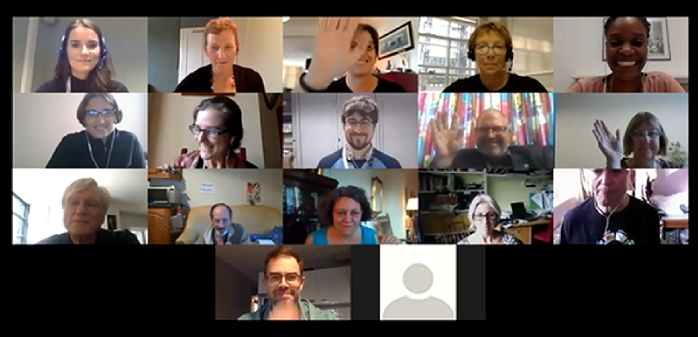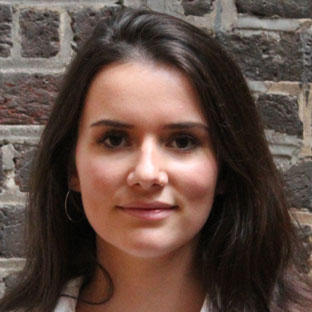Throughout autumn, the RSA Global Team coordinated a series of online events. Ten speakers spoke across three different events tackling issues ranging from how we might use the SDG framework to inspire local action to how the heritage industry might embrace innovation. After an initial pilot, the RSA is exploring the role that online events might play as part of our ongoing activity.
RSA Fellows live in over 100 different countries. Hosting online events could become an exciting new way for the RSA to connect up its international network of change-makers who are spread out all over the globe. Throughout our pilot event series this autumn, Fellows and non-Fellows from over 20 countries signed up to attend and we were joined by participants from US, Canada, UK, Norway, Spain, France and Lebanon among others. These online events provided a platform for Fellows to meet, become activated and inspired by each other in a virtual space. For those unable to reach a local RSA Event, the online platform enabled speakers and participants alike to dial in and contribute from the comfort of their own homes and offices, thus enriching the debate by bringing in a range of local and regional perspectives.
How can we use the SDG framework to inspire local action?
“Wherever we are in the world, we seem to be facing the same key major challenges… these challenges are not only complex but they are also interconnected” – Valerie Amato
The first event was held on the two year anniversary of the adoption of the UN Sustainable Development Goals and was chaired by the RSA’s Global Senior Manager, Adanna Shallowe. Our first speaker Valerie Amato introduced the 17 SDGs and their 169 targets, describing their complex and interconnected nature. Then, Jennifer Anderson shared case studies that illuminated how the SDGs are being used as an inspirational template by local businesses and communities. Jennifer shared how she has helped businesses, ranging from a road haulage company to a local lavender producer, to use the Goals to meet CSR objectives and unify company culture towards a positive planetary contribution. Using the SDG framework, Jennifer facilitated sessions with the road haulage company whose drivers fed back to the organisation that they identified with goals 3, 4, 8 and 10 and wished to get involved in the care of economic migrant refugees. Throughout discussions, it emerged that they had developed a deep compassion for people whose routes often intersect with their own journeys across Europe.
Speaker Robin Dickinson then explored SDG 17: Partnerships for the Goals, sharing learning from the 3637 registered partnerships focusing on SDG delivery. Robin shared aspects of his work with theCarbon Trust where the organisation has leveraged public funds for energy efficiency initiatives and invested in bringing forward energy efficiency technologies by driving private sector funding. Finally Christine Losecaat, Chair of Advance, focused on UN SDG Goal 5: Gender Equality and in particular Advance’s work on the targets focused on eradicating all forms of violence against women and girls in the public and private spheres as well as eliminating harmful practices such as child, early and forced marriage and FGM.
How might the clothing industry embrace sustainability?
Hosted in association with the RSA Sustainability Network and chaired by the Network Lead, Susan Harris, our second event addressed how the clothing industry might take meaningful action to enhance sustainability in a fast-moving, trend-driven consumer market. Joining us were speakers Honor Cowen, Senior Consultant at Anthesis Group, and Debbie Moorhouse, subgroup lead for the RSA Sustainability Network.
“The more and more we can have a forum where we share what is going on the more likely it is we can gain momentum” – Susan Harris
Speakers and guests shared their insights and perspectives on the clothing sector as a huge opportunity for sustainability. Ethical fabrics, transparency, zero waste, innovation and the importance of education were covered in Debbie’s talk. Honor then weaved in the role of supply chains and the implications arising from our increasingly fast fashion cycle, with 50 rotations a year compared to a traditional pattern of two cycles per year. Alarmingly, she revealed that the average consumer is now purchasing 60 percent more items of clothing compared to 2000, but each garment is kept half as long. More promising is the emerging pattern that millennials seem to be conscious, as opposed to blind, consumers. Pressure from NGOs and the media, heightened consumer awareness, and industry initiatives are starting to result in a more sustainable clothing industry. Honor highlighted the innovative ways in which private sector companies are beginning to embrace traceability and and communicate this message to consumers. Participants discussed initiatives by companies such as Patagonia, M&S and H&M and explored future trends, particularly around new fabrics, blockchain and the UN SDGs. Susan Harris strongly encouraged those on the call to sign up to the RSA Sustainability Network to continue the conversation.

Inspiring change in the heritage sector
This event was hosted in partnership with the RSA Heritage Network and chaired by the network’s lead, Isilda Almeida-Harvey. Launching formally in January 2018, the Network is aspiring to work with Fellows and organisations in a diversity of countries, learning from different insights, practices, and approaches by bringing together people involved at all levels of the heritage sector. RSA Fellows and invited guests discussed the links between heritage community and identity and explored how organisations have used the Heritage Index.
“We’re craving an authentic experience of heritage… interactions with stories and ideas. Heritage tells us where we are, who we are, and what we can be.” – Oliver Cox
We were first joined by Oliver Cox, Heritage Engagement Fellow at the University of Oxford, who shared a humorous and engaging talk where he drew comparisons between a visit to a historic house and a trip to IKEA. Oliver’s remarks were based around the premise that universities can add value to the historic house sector by providing content that is authentic, accurate, and accessible. Participants then got together in breakout rooms to discuss the question posed by Oliver: “How do we encourage an entrepreneurial mindset in heritage?"
Michael Jansen then transported us to Monschau, one of the closest German towns to the South of England, which has a rich but underutilised heritage. Michael walked us through the idyllic town, consisting of more than 300 historical buildings built on the banks of two rivers. If heritage is the connecting cord that links people and place, Michael warned that in Monschau this cord is at risk of unravelling. Although the town is a popular Christmas market destination, Michael shared that the town has no museum and that young people have little desire to live there. Heritage is all about the process and negotiation of change: what is kept, what ensures, and what is left behind; however in Monschau there is a risk that too much is being lost. Michael seized this urgent and crucial moment for intervention, and was keen for participants to share their stories and was eager to learn form the experience of others.
Connecting an international network of change-makers
Zoom’s breakout room functionality provided a dynamic and interactive way for participants to meet each other, delve into issues and respond to speakers’ questions. Breakout rooms replicated the face-to-face interaction and participation customary in an event held in a physical space; however, the events really came to life when Fellows based further afield or internationally brought their own expertise or local context to the global issues being discussed. In this way, an event held online has the ability to become a truly global platform for public discourse on progressive ideas and action, introducing a multiplicity of perspectives and facilitating the sharing of learning between places.
The RSA Global team would like to extend a special thanks to Fellowship Councillor, Judy Rees; the events would not have been possible without her brilliant training and support. Special thanks must also go to all of our amazing speakers who voluntarily gave their time to contribute their ideas and expertise, making the events such a resounding success.
If you are keen to participate in possible future online events, please get in touch with the RSA Global team with global topics that you would like to be addressed.
Related articles
-
Learning to think as a species
Julian Crib
Julian Crib FRSA responds to the RSA ANZ blogging challenge, hosted in collaboration with 92Y as part of the Seven Days of Genius Festival - a global festival celebrating the power of new ideas. Julian contemplates whether humans can learn to think collaboratively to tackle the greatest risks we face as a species.


Be the first to write a comment
Comments
Please login to post a comment or reply
Don't have an account? Click here to register.